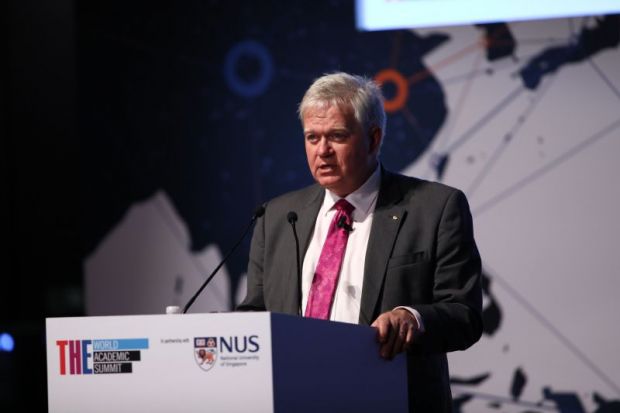The world’s only Nobel laureate vice-chancellor intends to step down this year, saying he is approaching the end of his “shelf life”.
Brian Schmidt said his term as head of the Australian National University (ANU) would end in December, explaining that he arrived in the job as an “agent of change” and wants to leave before he becomes "just the status quo”.
Delivering his annual “state of the university” address, Professor Schmidt said his term as vice-chancellor had been “both the most rewarding and the hardest job I have undertaken”.
“It is a job that requires unbridled enthusiasm and a continual look to the future, and it is a job therefore that can sit with an individual for only a limited amount of time,” he said.
“When I look back to my job application from 2015, almost everything I said I wanted to achieve as vice-chancellor is actually well on its way.”
Professor Schmidt will resume his role as ANU professor of astronomy based at Mount Stromlo Observatory west of Canberra. “After eight years, I am ready to get back to my research and teaching and may I say a somewhat more balanced life,” he said.
“Next year I will be proud to be sitting where you are in the audience, listening to my successor explain where they plan to lead our university.”
Professor Schmidt has earned respect as a fierce higher education advocate prepared to ruffle political feathers. At ANU, he strove to strengthen the institution’s status as the national university, fostering enrolments from across the country and focusing on the student experience.
He resisted unbridled growth of international student numbers, but this contributed to a dramatic reversal of the university’s financial fortunes in the first year of the coronavirus pandemic, when ANU parlayed a A$314 million (£181 million) surplus into an A$18 million deficit on the back of plunging tuition fee and investment revenues.
The institution posted a A$237 million surplus in 2021, thanks mainly to rebounding investment earnings and significant cuts to its expenses, particularly salaries.
Professor Schmidt said he would continue pressing the federal government to invest in the university’s work and “see us as an opportunity rather than an expense”.
“Australia’s future is in peril unless it ramps up its investment in research. I like to think of research like the nation’s superannuation – if you save money now by not investing, you will have a much poorer future,” he said.
He said he had sought the leadership eight years ago because the institution “looked to be in danger of losing its role as Australia’s national university” – a status that earns ANU a National Institutes grant worth more than A$200 million a year. “I am now confident that our mandate will remain as Australia’s national university,” he told the audience.
Professor Schmidt, who shared the 2011 Nobel Prize in Physics after helping to discover that the universe’s expansion is accelerating, announced his resignation as ANU leader just a day after taking over as chair of the Group of Eight research intensive universities.
Register to continue
Why register?
- Registration is free and only takes a moment
- Once registered, you can read 3 articles a month
- Sign up for our newsletter
Subscribe
Or subscribe for unlimited access to:
- Unlimited access to news, views, insights & reviews
- Digital editions
- Digital access to THE’s university and college rankings analysis
Already registered or a current subscriber? Login










